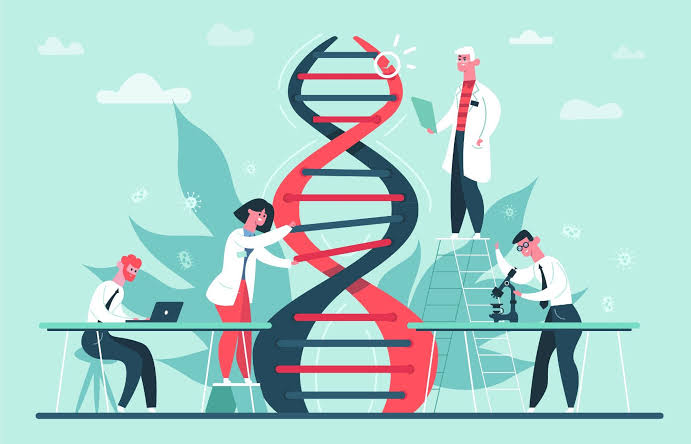The effects of genes

Dr Asha Pemberton, adolescent medicine specialist, constantly reminds us that the adolescent brain in not fully developed until age 25 years old. Until then, although they are seen and treated as adults, they are officially still late adolescent young adults, still growing and developing.
After 25 years though, they are fair game and anatomically and biologically, responsible for their actions, choices and decisions, no matter how ill advised. Until age 25 years, whoever you are growing up to be, is a hodgepodge matrix fight between your genetic profile (nature), environmental and parenting factors (nurture) and your own developing personality.
After 25 years, it is presumed that your personality and your own sense of self is now the main determinant factor, and you now choose what kind of adult you want to be. Well, the presumption is wrong.
The thing about genes is that different ones are expressed at different ages, so as we go along, we may think we now determine who we are, but in fact, our genetic base may still hold unrelenting power. The blueprint is not a surprise, and we can determine a lot about our physical, personality and emotional structure by looking at the genetic expressions in our biological families. One just has to look at your parents and grandparents to know what will happen to you as you age.
Aside from our physical structure, how we walk and hold our carriage is often genetic. How we bald and loose hair, how we turn grey, how we have facial hair. The start of our menstrual periods, the time of the adolescent growth spurt, the age at which the male voice changes, the size and type of our breasts.
Where we gain weight, overall obesity, the size of our buttocks, our ability to wine during a Carnival fete, our build for football, athletics or swimming, the size and shape of the penis, the size and shape of the vulva, our baseline libido, age of menopause.
Even our digestive system. Lactose intolerance, irritable bowel, sluggish bowel, propensity for constipation. Long-sightedness, short-sightedness, age of starting to wear glasses, risk of cataracts and glaucoma, dental health, propensity to lose teeth. Those are the things that are more obvious.
The medical predispositions are also important. Their influence is often underestimated until it is too late. If your parents and their siblings have a large amount of diabetes and hypertension, most likely you will also, at the same age theirs presented. Especially insulin-dependent diabetes. How we react to and metabolise medications, drugs, and alcohol. Heart disease, age of first heart attack or sudden death. Genes even determine fertility. If your mother or aunts get pregnant without even trying, chances are, you will be similar.
One of the more important genetic predispositions that we often again underestimate is the risk of cancer. Certain types of cancer seem to run in some families. Either the link can be direct like bowel, breast, prostate, and ovarian cancer which can account for up to 20 per cent of all cancers, or the genes can accelerate your risk for a different type of cancer.
Either way, when you look at family on both sides, if there have been multiple aunts and uncles who have died from cancer, especially if it is a particular type of cancer, you may have to increase your screening and assess your cancer risk.
The neuropsychology and neuropsychiatric aspects of genetics are even more overlooked since we often presume that innate personality is separate. There is a high correlation with genetics and Attention deficit hyperactivity disorder
(ADHD) and Autistic spectrum disorders. If you have a large number of family members who are socially awkward, maybe eccentric, with poor communication skills, it may be that there is a predisposition for autism and Asperger’s disease in your family and not just ‘that is how my family is’.
Often these disorders are diagnosed in retrospect after one person is assessed and confirmed and then it is realised that Uncle James was the same. Psychiatric disorders like schizophrenia, bipolar disease, and major depression. Cyclothymic disorders, a milder version of bipolar disorder and general mood disorders, can also be genetically transferred. Even Alzheimer’s is genetically correlated and if your family members are prone to early dementia and/or Alzheimer’s, it is something you may have to be proactive about.
Twin and family studies have demonstrated that personality traits are also inheritable. Essentially, if we are not proactive, preventative, and aware, we become our mothers and fathers.
When you look at your family members, that is your basic genetic blueprint that determines one third to half of who you are and who you will be. Of course, it is complexly multifactorial in terms of causality, predisposition, and association. But essentially there are three persons driving the car: you, your genetic code, and your ZIP code. You have to be aware of the compositions and influences and manage aggressively and appropriately.
When getting married, for instance, look at the person’s family. If they are a bunch of buttock orifices, have a second look at your fiancée. Speaking of buttocks, I accept I am flat-bottomed and cannot wine. If you see me in a Carnival fete with tight pants, trying to wine, be gentle. With some other genes I could easily have been Denise Belfon’s younger sister. Dammit.
By
Dr Joanne F Paul
She is an emergency medicine lecturer




